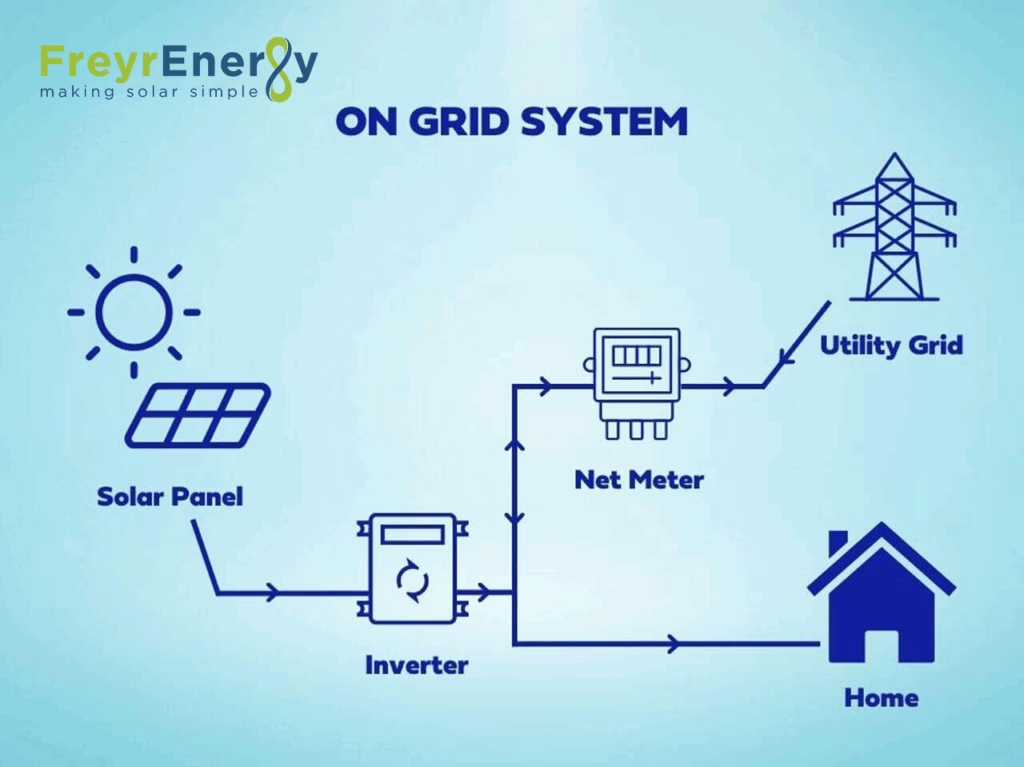An on grid solar system, also known as a grid-tied solar system, is the most widely deployed form of rooftop solar across the world. These systems do not need any batteries and are connected to the utility grid power.

What is an On-Grid Solar System?
An on grid solar system is a solar system directly connected to the electricity grid. It makes electricity from on grid solar panels, uses the electricity in the home, and can export power back to the solar grid and earn an auditable “credit” using net metering. As compared to off grid and on grid solar system while having stable access to the electricity grid can will much more often mean on grid configurations as the better option.
It is best suited for customers with stable grid power and minimal power cuts. Other than homes, even educational institutions, industrial units, commercial establishments use these systems as their primary source of power.
A solar on grid system is designed to first allow solar energy to be consumed by the customer. Beyond this, if the customer needs any excess power, it is drawn from the grid. If the customer’s energy requirement is lower than the power generated from the solar system, excess solar units are exported to the grid. This is possible through a ‘Net-meter’’.
Net meter is a device that records the energy supplied to the grid and the energy drawn from it. At the end of each month, the net energy consumed is recorded and the consumer is provided with a bill. This feature makes the on-grid solar system for home a great investment with high returns.
Benefits of On Grid Solar System for Home
The benefits of on grid solar system for the home include reduced electricity bills, ease of maintenance, and faster return on investment. As systems are still part of the electricity grid solar network and do not rely on batteries are cheaper and more efficient for all involved. The advantages of homes advantages of on grid solar system system configurations.
Here are the on grid solar system benefits:-
1. Huge reduction in electricity bills
With net meter in place, the consumer has to pay only for the surplus electricity he consumes, ensuring the bill generated every month is reduced drastically. Many of our customers have been able to reduce electricity bills by 90%.
2. Easy maintenance
The elimination of batteries in the ongrid solar system makes maintenance quite easy. It also eliminates the cost of upkeep of the batteries
3. Synchronize with other sources of power
These systems can also synchronize with a diesel generator on site. This is important in case grid power is not available.
4. Better ROI
The cost of an on grid solar system is lower than other types of solar systems because there are no batteries. It also generates the highest amount of power compared to other types of solar systems. The minimal maintenance and reduction in monthly power bills ensure the customer gets an ROI of 25 – 30%. This means the customer earns Rs.25,000 for every 1,00,000 they invest in solar.
With these advantages, an on-grid system is best suited for a customer with stable grid power and minimal power cuts. Other than homes, even educational institutions, industrial units and commercial establishments install an on-grid system as the system can synchronize with diesel generators to provide uninterrupted power.
Conclusion
For homeowners who appreciate energy savings and sustainability, on grid solar system is a great option if you’re looking for the cheapest and simplest long-term return on investment. We’re confident that on grid solar systems are a sound investment, while there are good benefits in comparing off grid and on grid solar system, this grid-tied solar system is hard to beat in reliability and efficiency in starting your clean energy journey.
